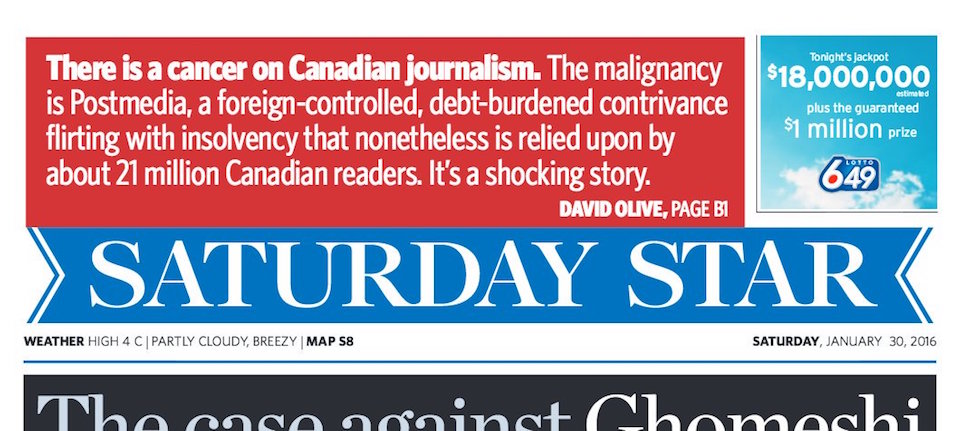
When Postmedia announced Monday it had swapped a raft of newspapers with its competitor Torstar, the company was emphatic: they could go ahead and do this without a green light from the Competition Bureau.
“The transaction is not subject to the merger notification provisions of the Competition Act, and no regulatory clearance is required to close the transaction,” Postmedia wrote in a release describing the coordinated plan to close newly acquired papers in order to eliminate the competition in markets across Ontario and beyond.
No matter.
Turns out the Competition Bureau will be reviewing the deal after all. While the Bureau is “aware that Postmedia have indicated that the transaction was not subject to the merger notification provisions of the Competition Act,” spokesperson Jayme Albert confirms to CANADALAND, “the Competition Bureau will be undertaking a review of the transaction.”
In other words, because the value of the transaction fell below a certain threshold, the publishers didn’t need to get advance approval for the deal. But the Bureau can still review it, and has now said it will. It’s just not clear that it will do anything beyond that.
(In a follow-up statement, Postmedia spokesperson Phyllise Gelfand says, “Our statement holds true that the transaction is not subject to the merger notification provisions of the Competition Act. Should the bureau have any questions of Postmedia we will certainly cooperate.” Torstar spokesperson Bob Hepburn says, “Regarding the Competition Bureau saying it will review the transaction, we have no comment because we don’t know any more than that.”)
At issue is a swap of a combined 41 newspapers between the two Toronto-based companies. Postmedia will be closing all but one of the 24 local community papers it acquired. Torstar will close all but four of the 17 papers it got in its end of the bargain. No cash changed hands in the transaction.
It’s expected the affected papers will close down by January, resulting in a loss of just under 300 jobs.
Media experts say it’s unlikely the Bureau will overturn the swap.
According to Carleton journalism professor Chris Waddell, it’s not a clear-cut case whether the two companies are even running afoul of competition laws.
“Traditionally, [when the Bureau] has looked at media mergers, it’s looked at the advertising end of it rather than the editorial end of it,” he says.
So, before Google and Facebook, this would have been simple to answer: Does one company now control the only place to buy advertising?
But that’s a complicated question these days, Waddell says. Microtargeted online ads from the big two tech companies mean the local newspaper isn’t the only game in town for your neighbourhood barber to place an ad.
“What they’ve constructed is an arrangement where they trade assets and [are] essentially creating regional advertising monopolies for both of them,” he says. “Which is, I guess, one way they hope they can survive in an era of pretty dramatic declines in advertising revenue and no indication that audiences are prepared or willing to pay for news online.”
For Dwayne Winseck, director of the Canadian Media Concentration Research Project and also a Carleton professor, it’s fairly clear the two companies are looking to get out of each other’s way.
“This looks like a territorial carve-up between Postmedia and Torstar into kind of respective non-compete zones,” Winseck says. “Both publishing groups acknowledge as much in their news releases this morning where they talk about taking advantage of regional synergies.”
Postmedia said in its announcement, after stating it would only keep open one of its new newspapers, “These actions will deliver cost synergies while maintaining those operations that are sustainable and support Postmedia’s strategy.”
Winseck says it’s an effort by both companies to monopolize whatever local advertising dollars are left in the different regions between each other. The swap saw the two media companies divide Ontario into two zones, with Torstar controlling the local papers in the area around the Golden Horseshoe, to the north of Toronto, and the Ottawa area, while Postmedia takes what’s left of the province.
Pretty clear geographies for Postmedia and Torstar after today's deal. Blue is Postmedia, Red is Torstar #cdnmedia pic.twitter.com/MEIf6cW2ij
— Ian Vandaelle (@IanVandaelle) November 27, 2017
Ryerson University emeritus professor of journalism John Miller says there are ways the companies might convince the Bureau its transaction is allowable.
“Postmedia may have an argument that [a given] area is well served by other publications,” he says. Miller pointed to Ottawa, where Postmedia will close down the daily free Metro paper because the publisher already owns two other dailies in the capital. It’s the kind of argument he says the Bureau has accepted in the past.
But mostly, he just doesn’t think it’s the kind of deal the Bureau would shut down. “It would be wishful thinking if I thought the Competition Bureau was going to do anything in this case,” Miller says. “They haven’t shown a history of doing that, and there’s no reason why they would start now.
Winseck says the broken promises made by Postmedia when it acquired the Sun chain of newspapers — for example, to keep newsrooms separate in cities with two papers — might give the Bureau a way to contest the transaction. “I think if the Competition Bureau had any spine, it could use these to do a little sabre-rattling.”
Marc Edge, who’s a media professor at Vancouver’s University Canada West as well as the University of Malta, has been following a similar development in British Columbia.
“This has been going on for years in the community newspaper industry in BC, with Black Press and Glacier Media trading titles back and forth, resulting in dozens of closures and local monopolies,” says Edge, who also wrote a book about media concentration in Vancouver.
“Maybe people will finally pay attention to this problem now that it has happened in Ontario.”
***